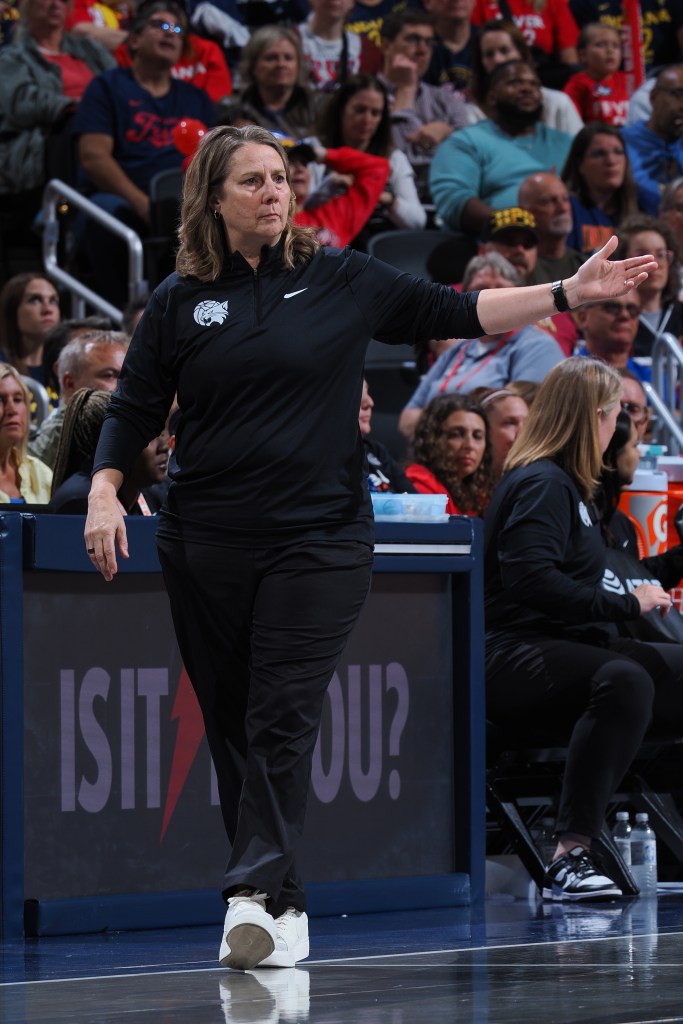Minnesota Lynx coach Cheryl Reeve said she’s incredibly drained professionally after the increased misogyny and racism within the WNBA during the 2024 season.
During an appearance on the “Good Game with Sarah Spain” podcast Monday, Reeve addressed the recent uptick in “vitriol” and “toxicity” around the WNBA since the league saw a meteoric rise in viewership and attendance after the arrival of 2024 rookie class, highlighted by Indiana Fever guard Caitlin Clark and Chicago Sky forward Angel Reese.
“It’s unacceptable and our players deserve better,” Reeve said. “I’m so proud of the players in the WNBA, the strength of their collective voices, they understand it. And I hope this is all going to calm down. I’m not sure.
“You know, because while diversifying your fan base is a great thing. I think that the fan base has been diversified in a way that is going to challenge us. And I think that, you know, what lies ahead, who speaks out and who utilizes their voices in this time is going to be really, really impactful in how this whole entire league moves forward.”
Reeve explained that it’s “disheartening” to see that negativity around the WNBA.
“[The] WNBA — I don’t want to say a safe space — but [the] WNBA was a space that we all felt like we could be ourselves. We were making great progress towards creating change for society larger, as a whole, right?
“… And so to have this vitriol, this toxicity, it’s a reminder. For example, [diversity, equity, and inclusion] coming out of [the murder of] George Floyd was one of the most amazing things. And I thought something that really was going to move corporate America forward, sports forward, opportunities.
“And look how fast all of that has been undone and people standing proudly doing so. It’s disheartening, and what I have tried to do, it’s been an incredible summer. It’s been incredibly difficult, incredibly draining professionally. And then now to add that personally, I think finding the energy, and I will find it, to make sure that we can not let this in the WNBA space.”
Reeve’s comments came after WNBA commissioner Cathy Engelbert faced backlash from players when she sidestepped a question about how she handles the “darker” side of social media and its impact on the league’s players, specifically when it comes to Clark and Reese’s fan bases and conversations about racism and sexuality.
After that, Reese accused Clark’s fans of being racist during a recent episode of her “Unapologetically Angel” podcast.
Former WNBA star Renee Montgomery supported the LSU alum.
The new WNBA rookie class, highlighted by Clark, Reese and Sparks forward Cameron Brink, helped boost viewership, revenue and attendance after their collegiate stardom transferred to the league from Iowa and LSU, respectively.
The rivalry between Clark and Reese played a pivotal role in growing the women’s game at the college level after LSU beat Iowa to win the 2023 NCAA title.
In 2024, the WNBA had its most-watched season in its history — and the league committed $50 million over the next two years to provide full-time charter flight service for its teams.
Reeve also opened up about the criticism she received as head coach of Team USA when Clark did not make the 12-player roster for the 2024 Summer Olympics in Paris.
“I think what people don’t get about it… is the coach of the national team truly has no power in the selection of the team,” Reeve said on Spain’s podcast.
USA basketball faced backlash by leaving Clark off the Olympic roster, as some fans believed she would help increase viewership at the Summer Games.
At the time, selection committee chair Jen Rizzotti explained the decision came down to basketball criteria — and not the fame and attention Clark would bring to the Olympics.
“My example that I give is, we were at a camp in Las Vegas, getting ready to go to Sydney, Australia for the World Cup. One of my players was there, Kayla McBride from the Minnesota Lynx,” Reeve said.
“I thought K-MAC had a tremendous camp and should have gone with us to Sydney and had no indication that anyone felt [differently], especially from our staff and some of the committee was in our meetings. It felt as if we all felt the same – that K-MAC had a great camp, and not that she’d make the final roster because she still had to go to Sydney and make that final cut, [but] I learned at the 11th hour that they cut my player.
“And so I said to K-MAC, if there’s ever a time for people to understand that the coach has no say in it, this is one of those times. But I get [it], you know, in this day and age, you’ve got to assign blame somewhere. I took a lot of bullets for USA basketball. You know, this is a unique time. I took a lot of bullets … it is what it is. When you sign up for the position, it is what it is.”









